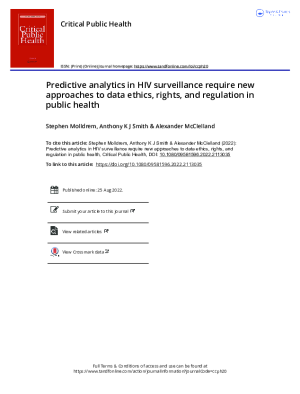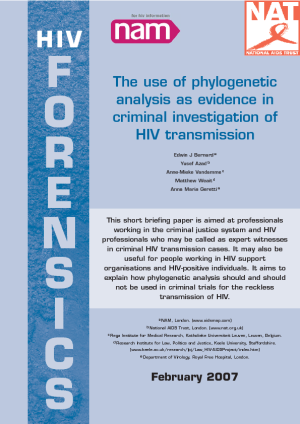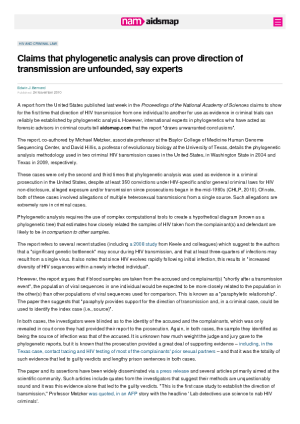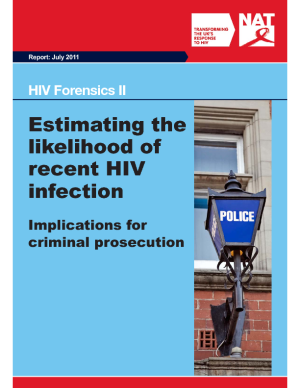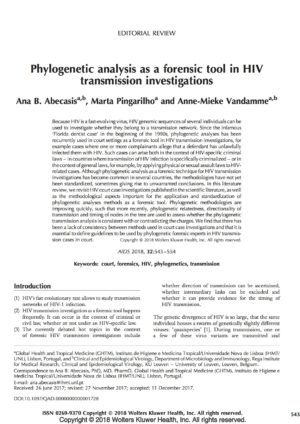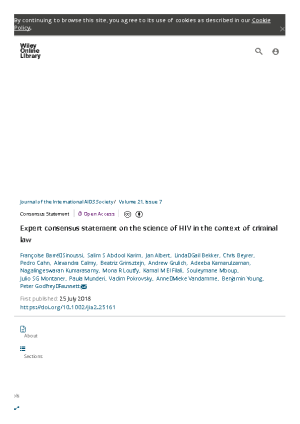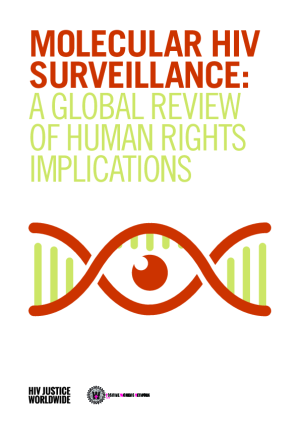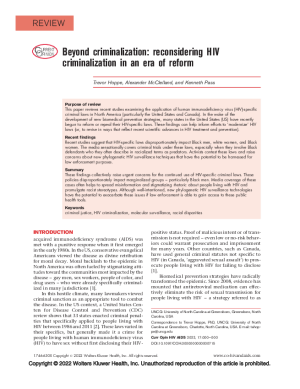In this commentary, the authors describe ethical problems arising from big data interventions in HIV surveillance and suggest some potential pathways for reform.
Understanding correct use of scientific tests
Includes resources explaining the limits of current scientific analysis to determine the likelihood that two person’s HIV is linked, and research summaries on HIV transmission risk.
The use of phylogenetic analysis as evidence in criminal investigation of HIV transmission
Aimed at professionals working in the criminal justice system and those who may be called as expert witnesses in criminal trials, the briefing explains how phylogenetic analysis should and should not be used in criminal trials for the reckless transmission of HIV.
HIV forensics: pitfalls and acceptable standards in the use of phylogenetic analysis as evidence in criminal investigations of HIV transmission
Considers the usefulness of phylogenetic analysis in HIV criminal trials, finding that phylogenetic analysis cannot prove that HIV transmission occurred directly between two individuals. Explains that phylogenetic analysis can exonerate individuals by demonstrating that the defendant carried a virus strain unrelated to that of the complainant.
- Alternative links
- HIV Medicine Wiley Online Library
Claims that phylogenetic analysis can prove direction of transmission are unfounded, say experts
Questions the merits of a phylogentics article published in Proceedings of the National Academy of Sciences, and warns against relying on its conclusions.
HIV Forensics II – Estimating the likelihood of recent HIV infection — implications for criminal prosecution
Considers the validity and meaning of scientific tests (Recent Infection Testing Algorithm) to estimate the likelihood of a recent infection in persons diagnosed as HIV positive in the context of prosecutions for HIV transmission.
Phylogenetic analysis as a forensic tool in HIV transmission investigations
A review of HIV court case investigations published in the scientific literature, as well as the methodological aspects important for the application and standardisation of phylogenetic analyses methods as a forensic tool. Concludes that there has been a lack of consistency between methods and that it is essential to define guidelines to be used by phylogenetic forensic experts in HIV transmission cases.
Expert consensus statement on the science of HIV in the context of criminal law
Twenty scientists from regions across the world developed this Expert Consensus Statement to address the use of HIV science by the criminal justice system. Description of the possibility of HIV transmission was limited to acts most often at issue in criminal cases. The authors recommend that caution be exercised when considering prosecution, and encourage governments and those working in legal and judicial systems to pay close attention to the significant advances in HIV science that have occurred over the last three decades to ensure current scientific knowledge informs application of the law in cases related to HIV.
- Alternative links
- Expertní prohlášení k vědeckým poznatkům o HIV v kontextu trestního práva ,
Molecular HIV Surveillance: A global review of human rights implications
Provides a detailed explanation of what MHS is and how it is used across the globe, including how the technology works, where it is being conducted, and by whom. The paper describes growing human rights concerns relating to the use of this technology and goes on to list a number of recommendations for the use of MHS which were gathered from an international literature review and from members of an Expert Advisory Group.
Beyond criminalization: reconsidering HIV criminalization in an era of reform
This paper reviews recent studies examining the application of HIV-specific criminal laws in North America (particularly the United States and Canada). In the wake of the development of new biomedical prevention strategies, many states in the United States (US) have recently begun to reform or repeal their HIV-specific laws. These findings can help inform efforts to ‘modernize’ HIV laws (or, to revise in ways that reflect recent scientific advances in HIV treatment and prevention).
